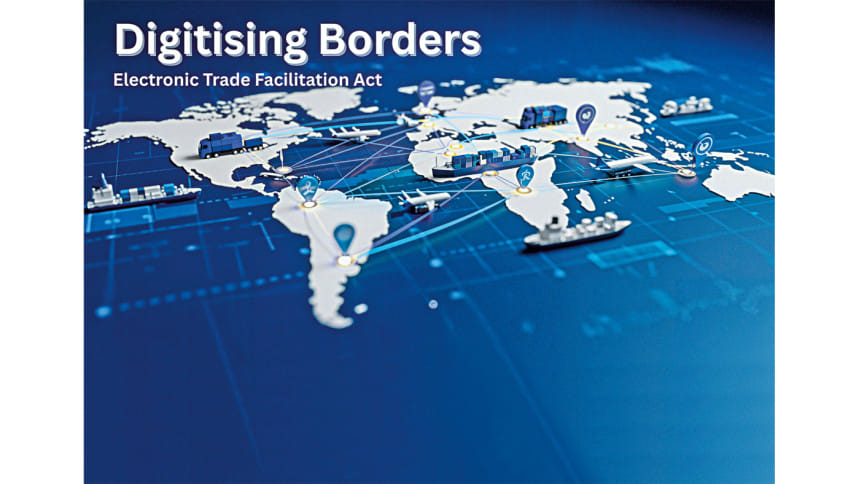Why Bangladesh urgently needs an Electronic Trade Facilitation Act

Bangladesh's trade has doubled in a decade, yet border trade formalities remain manual, redundant, and outdated. While peers digitise, Bangladesh risks falling behind without urgent reform. An Electronic Trade Facilitation Act (ETFA) would legally compel every border agency to adopt online systems, embed transparency, curb corruption, and align procedures with international standards.
Currently, an array of regulatory agencies, customs, port authorities etc. oversee parts of border trade formalities. With ministry-specific paperwork, fees, and data formats, consignments ping-pong between checkpoints, causing delays and undercutting exporters already racing to meet global deadlines. Hundreds of scattered Acts, ordinances, and rules underpin this maze, of which many are archaic and internally disconnected. Overarching legal and quasi-legal instruments like the Customs Act, 2023 and Import Policy Order cover only fragments of trade and ignore data-sharing, e-payments and risk-based clearances.
The urgency to enact an ETFA is growing because Bangladesh is set to graduate from its Least Developed Country (LDC) status in 2026. In addition, the country must meet its WTO TFA Category C commitments between 2025 and 2030. Bangladesh may fast-track passing the ETFA to take advantage of the remaining grace period and prove its competence to meet high international standards as soon as it graduates from LDC.
An Electronic Trade Facilitation Act will be a lot more than just a change in rules for Bangladeshi traders, it will completely improve how trade works. By replacing queues and paperwork with a single digital platform, the Act will usher in transparency, speed, sustainable growth, and thereby ensure competitiveness as the country graduates from its LDC status.
The use of risk-management (RM) tools is an important element of trade facilitation. A study by the USDA BTF Project titled "Quantifying the Benefits of Risk-Based Clearance," shows that introducing RM tools could reduce customs release times by 40–81%. Yet reforms are stalled because the Ministry of Commerce (MoC) can only request, not require, agencies to digitise. Similarly, the National Trade Facilitation Committee (NTFC) issues non-binding advice, so its decisions on second testing and RM remain largely unimplemented. Likewise, the Bangladesh Single Window (BSW), envisioned to link 19 border agencies, keeps missing rollout deadlines because no statute obliges participation as such. The ETFA can fix these gaps by granting the NTFC statutory authority, empowering the MoC to enforce deadlines, and compelling every regulator to join and use the BSW.
In effect, the ETFA will reboot Bangladesh's trade regime with an "electronic by design" mandate. As an umbrella law, it will merge the scattered facilitation measures, obliging all the border agencies to operate on interoperable platforms like the Bangladesh Single Window. Every permit, certificate, payment, and inspection must flow online which eradicates paper trails and reduces delays and grafts. Standardised risk-based rules deliver quick clearance, especially for perishables, through pre-arrival data, post-clearance audits and formal inter-agency groups that unblock bottlenecks. The prospective Act will override the conflicting statutes and clarify the grey areas. It will also oblige the MoC to publish an annual, agency-level Trade Facilitation Review to keep reforms on track. By cross-linking existing Advance Rulings and Authorised Economic Operator provisions in the Customs Act, 2023, ETFA can knit every process into a trusted digital highway for trade.
Moreover, the ETFA will provide institutional strength and transparency by upgrading the NTFC to a statutory body with an adequately staffed secretariat and budget and thereby enable it to give binding decisions. It will also mandate prompt WTO notification of any new or amended trade rules, keeping businesses and partners fully informed and ensuring predictable, trustworthy trade.
Bangladesh can fast-track reform by mirroring proven innovations of global pioneers. The US Trade Facilitation and Trade Enforcement Act (2015) mandated agency automation and risk-based inspections. South Korea's Electronic Trade Facilitation Act (2005) created a fully digital single window. Countries such as Mauritius, Nigeria and Zambia followed the suit. Each model rests on an umbrella statute, compulsory digitisation, shared data platforms, and binding accountability- pillars that reduces time and cost to trade and keep the country competitive in business.
To conclude, the ETFA will be a lot more than just a change in rules for Bangladeshi traders, it will completely improve how trade works. ETFA automates filings and e-payments, ending office visits, cash fees, and paper forms. Data-driven "Green Lanes" then speed trusted traders' cargo avoiding demurrage and sharpening supply-chain planning. A public portal, tariffs, rules, service timelines, and a live release-tracking dashboard, cuts information costs and lets businesses challenge delays. By replacing queues and paperwork with a single digital platform, the Act will usher in transparency, speed, sustainable growth, and thereby ensure competitiveness as the country graduates from its LDC status.
The writer is a Trade Facilitation and Policy Reform Specialist.

 For all latest news, follow The Daily Star's Google News channel.
For all latest news, follow The Daily Star's Google News channel. 



Comments